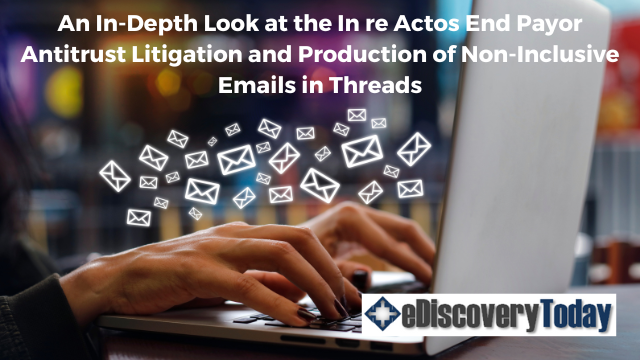
As I mentioned within recent in-depth coverage of one of the cases here, the May EDRM monthly case law webinar presented by Tom O’Connor (Director of the Gulf Legal Technology Center), Mary Mack (CEO and Chief Legal Technologist of EDRM), Hon. Andrew Peck (Ret.), Senior Counsel at DLA Piper had some really great cases to discuss.
Another case we discussed in that webinar was In re Actos End Payor Antitrust Litig., which had several interesting eDiscovery considerations, including the use of ESI protocols, withholding production of non-inclusive emails within a thread and the use of categorical privilege logs. Let’s take an in-depth look at the case here.
In re Actos End Payor Antitrust Litig.
In this case (details and link to full ruling here), New York Magistrate Judge Stewart D. Aaron, noting that “Takeda made its initial rolling productions using email threading even though the Discovery Protocol, by its terms, did not permit such approach” and observing that “Takeda’s exclusion of lesser included emails from production has resulted in the exclusion of the metadata associated with earlier emails in a chain”, ordered Takeda to produce “all responsive ESI to Plaintiffs, including earlier-in-time emails”. He also ordered the parties to meet and confer on privilege logs, related to the email threading issue, while also discussing the idea of using categorical privilege logs, stating: “categorical privilege logs are appropriately used in this Court”.
With that in mind, I mentioned to Tom that many eDiscovery providers tout their capability to put aside lesser included emails in a thread and limit review to only the fully inclusive emails and asked him if he thought this decision changes whether parties will continue to use this feature, or change how they use it.
Tom stated:
Well, I hope so because I’ve never been a fan of that feature for two reasons. One, I think it’s a great example of how technical people come up with a great technical feature that perhaps they really shouldn’t be doing. Is that something you want the technical staff to be doing automatically without anybody looking at the actual bodies of the emails? The idea is an interesting one, but I’m not warm about it.
Tom O’Connor, Director of the Gulf Legal Technology Center
Continuing, he said: “The second reason is the one the Court elucidated, which is it eliminates metadata for the older versions, which may be important, critical, and certainly relevant. So, I don’t like it. What’s really interesting to me here, though, is that the protocol that the parties had agreed on didn’t allow for it. So, in one sense, it raises the question: did the client know that the technical company was doing that, even though the client, the lawyers, had agreed to do something different in the protocol? So, if this decision leads to a better oversight of some of the technical processing of data, I’m all for it.”
Judge Peck added: “I don’t think the ESI protocol forbade having the emails logged as one as much as it was just totally silent. They either didn’t consider it or didn’t reach attunement. And that left the issue for the court to decide.”
I asked Judge Peck about the use of categorical privilege logs, when parties should consider using them, and whether there are reasons NOT to use them, even for cases with a lot of privileged documents.
Judge Peck began by saying, “It is not a coincidence that our local rule on privileged logs was amended to encourage parties to cooperate and to use categorical logs were appropriate at a time where I was the Southern District co-chair of the joint Southern/Eastern District local rules committee. If I were revising that today, I would probably say consider using categorical logs or metadata plus privilege logs.“
Continuing, he said:
But be that as it may, the problem with categorical logs is can the parties agree on appropriate categories?…The universal category is documents between the client and outside counsel after the trigger date, whether that is the date of filing the complaint or some other appropriate date. That’s an easy one. And usually there you don’t even log anything. You just say those are off the table. But what information will be given for each category? Categories work best when whatever either factual or legal issue is raised by the category is then ripe for judicial resolution. So, it may be the category is all communications between the counsel client and their outside PR firm. You don’t need much more logging than that to present. The question to the judge for resolution is that outside PR firm within the privilege or does it break the privilege?”
HON. ANDREW PECK (RET.), SENIOR COUNSEL AT DLA PIPER
Judge Peck also added: “A category that is ‘advice from in house counsel to client employees’ is probably not very helpful because it doesn’t clearly distinguish between business advice, legal advice, and worse, perhaps mixed business and legal advice. But the so-called traditional document by document privilege log became traditional somewhere in the “Dark Ages” of the 1990s, before {FRCP} rule 26(b)(5) was put into the rules. The advisory committee notes clearly indicated that document by document may be appropriate if there aren’t many documents on the privilege, but that in other cases categorical or other means may be appropriate.”
I mentioned to Mary that the dispute associated with excluding lesser included emails didn’t come to light until Takeda began producing documents and asked her what parties can do (if anything) to flush out potential areas of dispute in an ESI protocol before productions begin.
They should generate a production sample and do that very early, not on the eve of the discovery cut-off date.
Mary Mack, CEO, EDRM
Mary stated: “They should generate a production sample and do that very early, not on the eve of the discovery cut-off date. But categorical privilege logs and the metadata involved in the individual emails contained within the thread aside, there’s also disputes sometimes about {issues like} spreadsheets with formulas, PowerPoints with comments and notes, Words with track changes, whether or not you get the bcc’s and cc’s (as in this case), calendar items and of course, of course the threads. Memorializing it in a scheduling order is great, or at least by memo after the meet and confer. And I would just say that categorical logs are a fabulous thing and having the ability to have the dates and the senders/recipients, the subject line and everything, those metadata for the pieces, I think that’s really important. I think it’s important that samples go early so that a reaction can happen outside of motion practice.”
Of course, a member of the audience noted that you can suppress non-inclusive emails for review, yet still produce them if they are part of email threads with responsive inclusive emails. Regardless how you choose to address them, it’s important to get on the same page with opposing counsel so that you don’t have to redo productions!
In re Actos End Payor Antitrust Litig. was another interesting and fun case to discuss, and you can catch our full discussion of it and the other interesting May 2022 cases here. This case fostered interesting discussion about the handling of non-inclusive emails and the potential benefits of categorical privilege logs. Look for coverage of more cases on eDiscovery Today and discussion of those cases on an upcoming EDRM case law webinar.
Our next webinar is Thursday, July 28th at 1pm ET – feel free to check out the case topics and get the registration link here!
Experience more of Doug Austin’s great work at the eDiscovery Today blog here.
Follow Doug Austin on JD Supra here.
Follow EDRM on JD Supra here.


